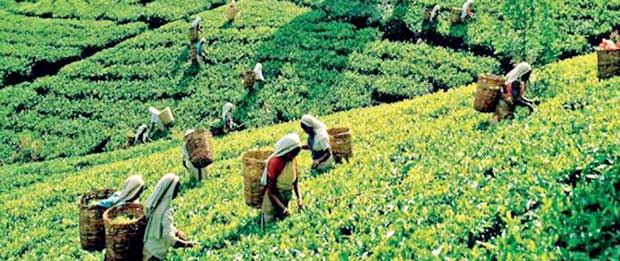Reply To:
Name - Reply Comment

It has been over 150 years since Sri Lanka witnessed the establishment of its very first tea plantations and while the crop and the island have since become synonymous with one another, today Sri Lanka’s tea industry faces challenges on an unprecedented scale. From labour shortages to the need for greater replanting and the crippling ban on chemical weedicides that has led to drastically lowered yields, it is clear that carefully considered steps must be taken by all stakeholders in order to ensure the continued legacy of tea in Sri Lanka.
With nearly a century of plantation sector experience between them, Vernon Tissera and Major Malcolm Peiris elaborated on their experience in the industry and offered insights into some of the present challenges facing the tea sector. Both Tissera and Major Peiris got their start in the plantation sector at Whittalls Estates & Agencies Ltd with the former joining fresh out of school in 1950 and the latter in 1955.

Tissera’s roots had always been in the plantation sector, having been born on the estate managed by his father, who also served as a superintendent for Whittalls, hence from a young age. Tissera had always aspired to join the industry. Working briefly under his father, Tissera was thereafter assigned to Drayton Estate as a creeper and over the next six years would rise from the rank of assistant superintendent at Battawatte Estate, Madulsima. He thereafter joined High Forest Estate as a Senior Assistant.
In the years leading up to nationalization, he developed a profound understanding of the intricacies of Ceylon Tea and serving as a leading figure in early replanting initiatives and following a brief period working as a manufacturing advisor to Carritt Tea Estates in South India before returning to Sri Lanka to work for the Janatha Estates Development Board (JEDB), where he later served as Chairman in 1990. From crop to cup, Tissera developed extensive knowledge into every aspect of the tea industry, only retiring in 2002, full 52 years later.
“Over those initial years we were certainly faced with many challenging situations, but I would say that most of these were very directly related to conditions on the ground and so in the early years, I would say that Diyagama West and Kirkoswald Estate, Bogawantalawa were some of our most challenging estates. Even there, we were able to eventually set it right and although it required fairly substantial investments at the outset, the returns in term of improved yield more than made up for it over time,” Tissera explained.
Particularly in the latter case, he noted that in Kirkoswald, with only 27 percent of VP tea in bearing, a yield of 2000 kilogrammes per hectare was achieved, which even today is held up as a successful case study for replanting.
Shifting the discussion to present-day challenges, Tissera noted that even today, replanting remained an urgent concern. However, he noted that unlike in the past, the current levels of interference with the plantation sector’s management were a growing concern. In that regard, he added that moving forward, it was absolutely imperative that the management of RPCs be chosen carefully in order to ensure that only those individuals experienced in plantation management be allowed to steer the course of each company, warning that failure to do so would almost certainly lead to serious challenges in the industry over the medium to long term.
“During the time of nationalization, it was certainly a very different ballgame, there were lots of strikes and like many other veteran planters from that era, we of course had disagreements with trade unions and leaders like Thondamman. However, at the end of the day, we were all cognizant of the fact that the work had to get done and eventually some reasonable compromise was reached.
With the shift towards privatization too, the mood was mostly quite optimistic and for me personally, I never had to face another strike situation or deal with any untoward government interference because while it was a form of semi-government operation, we were mostly left to our own devices and from what we see today, this is no longer the case.”
A clear example of this type of interference, according to Tissera, is the unreasonable ban on chemical weedicides like glyphosate.
“I believe that the glyphosate ban is a clear example of over emphasis on issues that frankly do not exist. To my knowledge, we have never had a single case of CKDu in the estate sector and as Dr. Waidyanada has noted all produce in the estates has been carefully tested for residues which have been proven beyond a doubt to be at levels extremely far below the European accepted standard at 700 parts per billion as opposed to one part per billion in soil samples water and vegetables tested in Sri Lanka.”
Call for greater collaborative development
Joining the industry just after Tissera, Major Peiris was hand-picked by the warden of S. Thomas’ College following a request made by the then Chairman of Whittals Estates, Dimo Green. Starting creeping at Matuwagala, Kiriella under a European superintendent, Major Peiris quickly rose through the ranks and within just six months, had himself reached the rank of Assistant Superintendent for the Golinda group, where he helped to oversee the management of both tea and rubber estates.
Initially moving more deeply into the rubber sector when he was promoted to the Maha Oya rubber estate in Dehiovita, Major Peiris was eventually transferred to Warakapola under the era of nationalization and was thereafter made a manufacturing advisor for rubber, while serving as a Superintendent on the estate, in addition to his capacity as a visiting agent (VA).
Subsequently, returning to tea, while also managing rubber estates, Major Peiris spent the next three decades working closely with labour in the estates to develop and hone productivity despite numerous varied challenges and by 1991, was appointed as Regional Chairman of Horana under State Plantations Corporation, under the auspices of famed Plantations Minister of that era, Ranjan Wijeratne – himself an ex-planter. During the period leading up to privatization, Major Peiris served for three years in Mathale and Horana, respectively and further two years in Ratnapura before moving to the Central Board in Colombo.
By the time of privatization, Major Peiris was serving as a Director at Pussellawa Plantations, where he oversaw tea and rubber estates for another four more years before retiring in 1997. Similar to Tissera’s journey in the plantation industry, Major Peiris too was able to advance replanting initiatives, particularly in rubber estates under his management and to a lesser extent in tea.
“Even that time replanting was an extremely expensive process and there were a few who were unhappy about these plans but we knew that it was crucial to the continued success of the industry so we went ahead on a large scale and proved that it was viable and could be done.
One of the main challenges however, is that unlike rubber, tea has substantially more points per hectare to replant and so we could only replanting for tea at a much lower rate. Even then we faced significant challenges in this regard and my main concern for the industry is how they will manage to make the investments they need into replanting, especially given the labour shortages that will get worse over time,” he stated.
Particularly given the substantial challenges facing the industry, Major Peiris called on all stakeholders to work together in order to ease the substantial burden being placed on the industry, particularly in relation to cost of production, labour shortages and the ban on glyphosate.
“The fact that labour wages will continue to increase is something which I feel is inevitable and this is something that must happen if these communities are going to be able to achieve the independence they need proactively improve their own living standards. The only way to sustain such improvements will have to be through a collaborative effort from all stakeholders.
The ban on glyphosate is a good example of a failure to consult properly with the industry and its stakeholders. We used glyphosate for years and it was highly effective in controlling weeds and that is the key concern. If not glyphosate, then some other substance needs to be allowed but the end goal has to be to support tea producers with everything that they need to move this vital industry forward,” Major Peiris stated.